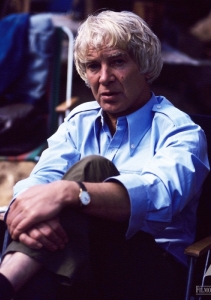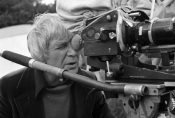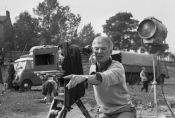Janusz Nasfeter

Film director, screenwriter, teacher and writer. Born on August 15, 1920, in Warsaw, died on April 1, 1998, in Warsaw. A graduate of the Directing Department of the State Film School in Łódź (1950, diploma in 1951). In the years 1950-1956, he worked at the Łódź Educational Film Studio, where he made short instructional videos and documentaries. In 1956, he joined the teaching staff of Łódź Film School. He also wrote short stories and screenplays, and radio plays. Several national cultural magazines published his drawings and stories. He is the author of the novel Łowcy kangurów/Kangaroo Hunter.
In 1958, he debuted with the feature film Małe dramaty/Small Dramas, composed of two poignant stories (Karuzela/Carousel, Upadek milionera/The Fall of A Millionaire) which disprove the myth of childhood as the happiest time in one's life. Children's dramas, in his opinion, are remembered forever, as they have a particularly strong impact on one’s later life. He continued the theme of childhood in his Kolorowe pończochy/Coloured Stockings (1960, award in Venice), a subtle psychological study of two girls and their everyday problems, hopes and failures, as well as in Mój stary/My Old Man (1962), where he analysed the complicated relationship of a father and son who seem unable to communicate.
His Zbrodniarz i panna /The Criminal and the Maiden (1963), a suspense-filled thriller about the investigation of a murder committed during a robbery, was the first of a series of films addressed to adult audiences. Films such as Ranny w lesie/The Wounded in the Forest (1963), an adaptation of the novel by Witold Zalewski, and Weekend z dziewczyną/Weekend with a Girl (1968), based on Edmund Niziurski’s short story, are insightful, psychological dramas set during the German occupation and made in the style of a partisan ballad. It is, however, Niekochana/Unloved (1965, award in San Sebastian), that is particularly noteworthy. The film, loosely based on the excellent story by Adolf Rudnicki, tells the story of a young Jewish girl passionately in love with a Polish student and set on the night of August 31-September 1, 1939. His Długa noc/Long Night ( 1967, premiere only in 1989), inspired by the novel by Wiesław Rogowski Noc/Night, is a poignant portrayal of a small town in 1943, somewhere in Eastern Poland; one of its residents is hiding a Jew. Fear, insecurity and, finally, greed, are exposed as character traits in some of the neighbours – something that probably would never be revealed under normal circumstances.
In 1970, he returned to childhood themes in the drama Abel, twój brat/Abel, Your Brother (awards in Poznan, Łagów, Moscow, Tehran), the story of a 12-year-old boy who cannot adapt to the cunning and flashiness of the gang ruling his classmates. He continued addressing similar themes in other interesting films, such as Ten okrutny, nikczemny chłopak/This Cruel, Wicked Boy (1972, awards in Łagów, Moscow), Motyle/Butterflies (1972, awards in Łagów, Poznan, Tehran, Belgrade), Nie będę cię kochać/I will not love you (1975, awards in Gdansk, Gijon), Królowa pszczół/Queen of Bees (1977, awards in Poznan), proving that he was an outstanding expert in child psychology, as well as an excellent writer and director.
Jerzy Armata
Selected filmography
-
1958
LITTLE DRAMAS









